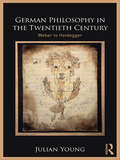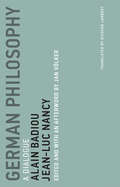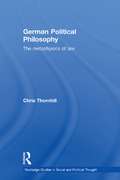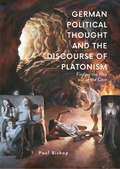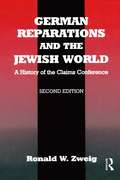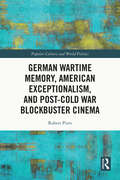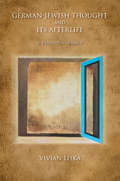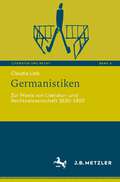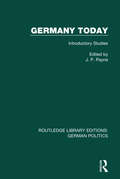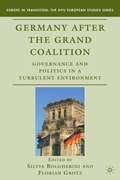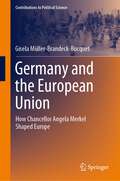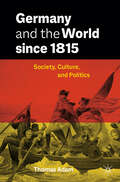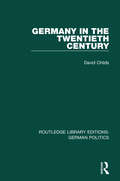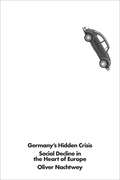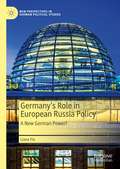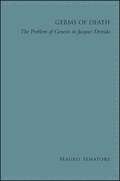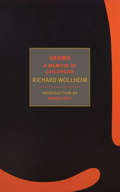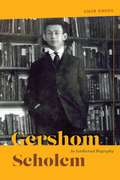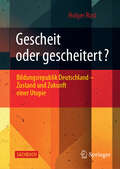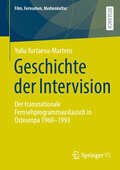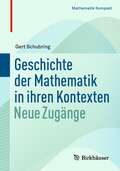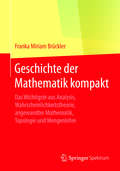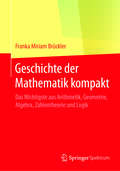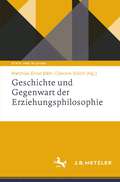- Table View
- List View
German Philosophy in the Twentieth Century: Weber to Heidegger
by Julian YoungThe course of German philosophy in the twentieth century is one of the most exciting, diverse and controversial periods in the history of human thought. It is widely studied and its legacy hotly contested. In this outstanding introduction, Julian Young explains and assesses the two dominant traditions in modern German philosophy – critical theory and phenomenology – by examining the following key thinkers and topics: Max Weber’s setting the agenda for modern German philosophy: the ‘rationalization’ and ‘disenchantment’ of modernity resulting in ‘loss of freedom’ and ‘loss of meaning’ Horkheimer and Adorno: rationalization and the ‘culture industry’ Habermas’ defence of Enlightenment rationalization, the ‘unfinished project of modernity’ Marcuse: a Freud-based vision of a repression-free utopia Husserl: overcoming the ‘crisis of humanity’ through phenomenology Early Heidegger’s existential phenomenology: ‘authenticity’ as loyalty to ‘heritage’ Gadamer and ‘fusion of horizons’ Arendt: the human condition Later Heidegger: the re-enchantment of reality. German Philosophy in the Twentieth Century: Weber to Heidegger is essential reading for students of German philosophy, phenomenology and critical theory, and will also be of interest to students in related fields such as literature, religious studies, and political theory.
German Philosophy: A Dialogue (Untimely Meditations #11)
by Alain Badiou Jean-Luc NancyTwo eminent French philosophers discuss German philosophy—including the legacy of Kant, Hegel, Nietzsche, Adorno, Fichte, Marx, and Heidegger—from a French perspective. In this book, Alain Badiou and Jean-Luc Nancy, the two most important living philosophers in France, discuss German philosophy from a French perspective. Written in the form of a dialogue, and revised and expanded from a 2016 conversation between the two philosophers at the Universität der Künste Berlin, the book offers not only Badiou's and Nancy's reinterpretations of German philosophers and philosophical concepts, but also an accessible introduction to the greatest thinkers of German philosophy. Badiou and Nancy discuss and debate such topics as the legacies of Kant, Hegel, and Marx, as well as Nietzsche, Adorno, Fichte, Schelling, and the unavoidable problem of Heidegger and Nazism. The dialogue is contentious, friendly, and often quotable, with strong—at times passionate—positions taken by both Badiou and Nancy, who find themselves disagreeing over Kant, for example, and in unexpected agreement on Marx, for another. What does it mean, then, to conduct a dialogue on German philosophy from a French perspective? As volume editor Jan Völker observes, “German philosophy” and “French philosophy” describe complex constellations that, despite the reference to nation-states and languages, above all encompass shared concepts and problems—although these take a range of forms. Perhaps they can reveal their essential import only in translation.
German Political Philosophy: The Metaphysics of Law (Routledge Studies in Social and Political Thought #Vol. 49)
by Chris ThornhillThis book combines philosophical, intellectual-historical and political-theoretical methodologies to provide a new synoptic reading of the history of German political philosophy. Incorporating chapters on the political ideas of Luther and Zwingli, on the politics of the early Enlightenment, on Idealism, on Historicism and Lukács, on early Twentieth-Century political theology, on the Frankfurt School, and on Habermas and Luhmann, the book sets out both a broad and a detailed discussion of German political reflection from the Reformation to the present. In doing so, it explains how the development of German political philosophy is marked by a continual concern with certain unresolved and recurrent problems. It claims that all the major positions address questions relating to the origin of law, that all seek to account for the relation between legal validity and metaphysical and theological superstructures, and that all are centred on the attempt to conceptualise and reconstruct the character of the legal subject.
German Political Thought and the Discourse of Platonism: Finding the Way Out of the Cave
by Paul BishopTaking Plato’s allegory of the cave as its starting-point, this book demonstrates how later European thinkers can be read as a reaction and a response to key aspects of this allegory and its discourse of enchainment and liberation. Focusing on key thinkers in the tradition of European (and specifically German) political thought including Kant, Marx, Hegel, Nietzsche, Heidegger, and the Frankfurt School, it relates them back to such foundational figures as Rousseau, Aristotle, and in particular Plato. All these thinkers are considered in relation to key passages from their major works, accompanied by an explanatory commentary which seeks to follow a conceptual and imagistic thread through the labyrinth of these complex, yet fascinating, texts. This book will appeal in particular to scholars of political theory, philosophy, and German language and culture.
German Reparations and the Jewish World: A History of the Claims Conference
by Ronald W. ZweigGerman Reparations and the Jewish World" has become a standard reference work since it was first published. Based extensively on archival sources, the author examines the difficult debate within the Jewish world whether it was possible to reach a material settlement with Germany so soon after Auschwitz. Concentrating on how the money was spent in rebuilding Jewish life, he also analyzes how the reparations payments transformed the relations bteween Israel and the diaspora, and between different Jewish political and ideological groups. This revised and expanded edition includes material on sensitive relief programmes from archives that have only recently been opened to researchers. In a new, extensive introductory essay the author reexamines the reparations, restitution and indemnification processes from the perspective of 50 years later.
German Wartime Memory, American Exceptionalism, and Post-Cold War Blockbuster Cinema (Popular Culture and World Politics)
by Robert PirroThis book excavates the diverse and mostly unnoticed political meanings made available to American and German audiences by the blockbuster films helmed by transplanted West German directors Roland Emmerich and Wolfgang Petersen.Through formal film analysis, broad consideration of American and German film criticism, and reflection on relevant political developments of the post-Cold War era, the book reveals how traces of Germany’s experience of dictatorship and wartime destruction find inadvertent cinematic expression in ways that helped American and German moviegoers find orientation in the changed political and cultural landscape of a newly globalized world. To complement and deepen the analysis of the Hollywood output of Emmerich and Petersen, the book juxtaposes the creative product of these transplanted directors to examples of a converse cinematic phenomenon considered under the label, American Babelsberg, which encompasses World War Two-themed films shot by American directors in Germany utilizing the production facilities at Babelsberg. Focus here is placed particularly on two high-profile cinematic releases of the aughts, Valkyrie (2008), and Inglourious Basterds (2009). The magnetic attraction to, or nettlesome burden of, World War Two memories on these directors of American Babelsberg and German Hollywood is explained in this book by the entwined histories of Germans and Americans, the different challenges of national self-definition and renewal they faced in the post-Cold War world, and their long-standing and ongoing transatlantic discourse of political ideas and cultural ideals.This book will be of great interest to students and scholars of film studies, politics, popular culture, and contemporary history.
German-Jewish Thought and Its Afterlife: A Tenuous Legacy
by Vivian LiskaInGerman-Jewish Thought and Its Afterlife,Vivian Liska innovatively focuses on the changing form, fate and function of messianism, law, exile, election, remembrance, and the transmission of tradition itself in three different temporal and intellectual frameworks: German-Jewish modernism, postmodernism, and the current period. Highlighting these elements of theJewish tradition in the works of Franz Kafka, Walter Benjamin, Gershom Scholem, Hannah Arendt, and Paul Celan, Liska reflects on dialogues and conversations between themandonthereception of their work.She shows how this Jewish dimension of their writings is transformed, but remains significant in the theories of Maurice Blanchot and Jacques Derrida and how it is appropriated, dismissed or denied by some of the most acclaimed thinkers at the turn of the twenty-first century such as Giorgio Agamben, Slavoj i ek, and Alain Badiou.
Germanistiken: Zur Praxis von Literatur- und Rechtswissenschaft 1630‒1900 (Literatur und Recht #4)
by Claudia LiebHaben die germanischen Götter die Poesie und das Recht erfunden? Kann man einen Text rekonstruieren wie eine Tat? Sind Juristen oder Philologen die besseren Leser? Ist der Wissenschaftler so genial wie der Dichter? ‒ Vor rund 400 Jahren befasste sich eine gelehrte Denkgemeinschaft mit deutschen Texten aus Literatur und Recht. Vor fast 300 Jahren wurden die Spezialisten des deutschen Rechts „Germanisten“ genannt und bald auch die Experten deutscher Literatur. Claudia Liebs Analyse der gemeinsamen Vorgeschichte von Literatur- und Rechtswissenschaft beschreibt erstmals die historischen Verflechtungen von philologischer und juristischer Germanistik.
Germany Today: Introductory Studies (Routledge Library Editions: German Politics)
by John P. PayneThis book, originally published in 1971, provides clear analysis of German affairs at the end of the 1960s. Without neglecting the historical dimension of recent developments, it examines some of the problems the German people faced in the post-war years. Written by experts, but nonethless in an accessible style the essays in this book give an insight into the methods of particular disciplines such as history, economics, politics or sociology whilst offering an introduction to many aspects of German life.
Germany after the Grand Coalition
by Silvia Bolgherini Florian GrotzIn Germany, Grand Coalitions of the two major parties - the Christian Democrats (CDU/CSU) and the Social Democrats (SPD) - generally have a bad reputation. Hence, the CDU/CSU-SPD government under Angela Merkel (2005-2009) was neither the parties' nor the citizens' preferred choice, its performance was seen quite critical from the outset, and it was finished without further ado after the 2009 federal election. Has the Grand Coalition 2005-2009 been a single episode or rather a turning point for German politics? This book provides a retrospective of the first Merkel government, an analysis of the 2009 election and an account of its prospective consequences.
Germany and the European Union: How Chancellor Angela Merkel Shaped Europe (Contributions to Political Science)
by Gisela Müller-Brandeck-BocquetThis book aims to present a coherent picture of Germany’s European policy during Merkel’s chancellorship. At the same time, it traces the development of the EU in the period 2005–2021. Accordingly, the European crises and the internal and external threats to the integration community are addressed, as well as the jointly developed solutions. Thus, on the one hand, the book shows what Germany was willing to do for Europe; on the other, it reveals how the EU was able to develop further as the most important point of reference for German politics and power.
Germany and the World since 1815: Society, Culture, and Politics
by Thomas AdamThis textbook provides a history of modern Germany, locating the country’s social, cultural, and political developments within their proper global and transnational context. The author argues that most developments in German culture, society, and politics throughout the nineteenth and twentieth centuries were caused by wider global and transnational trends. A history of the German people rather than the German state, the book focusses on non-state and non-government actors, intercultural transfers, and applies the approach of ‘thick description’ to analysing the creation of German culture, society, and identity from the era of the Napoleonic wars right up to the present post-unification Germany. This includes an examination of German migrants’ journeys to their new homes in the Americas and, thus, the creation of a global German diaspora with cultural and social networks beyond its home country’s borders. The book further focusses on the transfers that connected German society and culture with those of other countries; for instance, chapters cover the transfer of football from England to Germany, the transfer of the Christmas holiday tradition from Germany to other countries, and the development of eugenics in Germany within its global context.
Germany in the Twentieth Century (Routledge Library Editions: German Politics)
by David ChildsThe book traces the development of Germany from the Kaiser’s Reich in the 1870s to the reunited democratic state led by Helmut Kohl in the 1990s. The author begins by countering the popular view of Germany before 1914 as irredeemably reactionary, and after assessing Germany’s part in the First World War, he outlines the rise and fall of the Weimar Republic. The 12 years of Hitler’s destructive experiment are presented in a balanced way as part of the overall development of the country. Germany in defeat is then discussed, as is heer rebirth under Four Power occupation. The last chapters explore the two separate German states and the events leading up to the restoration of German unity.
Germany's Hidden Crisis: Social Decline in the Heart of Europe
by Oliver NachtweyAn excellent study of how neoliberalism is causing a crisis in GermanyOne of the German-speaking world's leading young sociologists lays out modern Germany's social and political crisis and its implications for the future of the European hegemon. Upward social mobility represented a core promise of life under the "old" West German welfare state, in which millions of skilled workers upgraded their VWs to Audis, bought their first homes, and sent their children to university. Not so in today's Federal Republic, however, where the gears of the so-called "elevator society" have long since ground to a halt. In the absence of the social mobility of yesterday, widespread social exhaustion and anxiety have emerged across mainstream society. Oliver Nachtwey analyses the reasons for this social rupture in post-war German society and investigates the conflict potential emerging as a result, concluding that although the country has managed to muddle through the Eurocrisis largely unscathed thus far, simmering tensions beneath the surface nevertheless threaten to undermine the German system's stability in the years to come.
Germany’s Role in European Russia Policy: A New German Power? (New Perspectives in German Political Studies)
by Liana FixThis book contributes to the debate about a new German power in Europe with an analysis of Germany’s role in European Russia policy. It provides an up-to-date account of Germany’s “Ostpolitik” and how Germany has influenced EU-Russia relations since the Eastern enlargement in 2004 - partly along, partly against the interests and preferences of new member states. The volume combines a rich empirical analysis of Russia policy with a theory-based perspective on Germany’s power and influence in the EU. The findings demonstrate that despite Germany’s central role, exercising power within the EU is dependent on legitimacy and acceptance by other member states.
Germinal Life: The Difference and Repetition of Deleuze
by Keith Ansell-Pearson Keith Ansell PearsonGerminal Life is the sequel to the highly successful Viroid Life. Where Viroid Life provided a compelling reading of Nietzsche's philosophy of the human, Germinal Life is an original and groundbreaking analysis of little known and difficult theoretical aspects of the work of French philosopher Gilles Deleuze.In particular, Keith Ansell Pearson provides fresh and insightful readings of Deleuze's work on Bergson and Deleuze's most famous texts Difference and Repetition and A Thousand Plateaus. Germinal Life also provides new insights into Deleuze's relation to some of the most original thinkers of modernity, from Darwin to Freud and Nietzsche, and explores the connections between Deleuze and more recent thinkers such as Adorno and Merleau-Ponty.
Germs of Death: The Problem of Genesis in Jacques Derrida (SUNY series in Contemporary French Thought)
by Mauro SenatoreGerms of Death explores the idea of genesis, or dissemination, in the early work of Jacques Derrida. Looking at Derrida's published and unpublished work from "Force and Signification" in 1963 to Glas in 1974, Mauro Senatore traces the development of Derrida's understanding of genesis both linguistically and biologically, and argues that this topic is an overlooked thread that draws together Derrida's readings of Plato and Hegel. Demonstrating how Derrida's analysis liberates the understanding of genesis from Platonic and Hegelian presupposition, Senatore also highlights Derrida's engagement with the biological thought of his day. Senatore also shows that the implications of Derrida's insights extend into contemporary ethical and political questions relating to postgenomic conceptions of life.
Germs: A Memoir of Childhood (G - Reference,information And Interdisciplinary Subjects Ser.)
by Richard WollheimA brilliant, meandering exploration of family and childhood memory by one of the most original British philosophers of the twentieth century.Germs is about first things, the seeds from which a life grows, as well as about the illnesses it incurs, the damage it sustains. Written at the end of the life of Richard Wollheim, a major British philosopher of the second half of the twentieth century, this memoir is not the usual story of growing up, but very much about childhood, that early world we all share in which we do not not know either the world or ourselves for sure, and in which things--houses, clothes, meals, parents, the past--loom large around us, seeming both inevitable and uncontrollable. Richard Wollheim's remarkable, moving, and entirely original book recovers this formative moment that makes us who we are before we really are who we are and that haunts us all our lives in lucid and lyrical prose.
Gershom Scholem: An Intellectual Biography
by Amir EngelGershom Scholem (1897–1982) was ostensibly a scholar of Jewish mysticism, yet he occupies a powerful role in today’s intellectual imagination, having an influential contact with an extraordinary cast of thinkers, including Hans Jonas, Martin Buber, Walter Benjamin, Hannah Arendt, and Theodor Adorno. In this first biography of Scholem, Amir Engel shows how Scholem grew from a scholar of an esoteric discipline to a thinker wrestling with problems that reach to the very foundations of the modern human experience. As Engel shows, in his search for the truth of Jewish mysticism Scholem molded the vast literature of Jewish mystical lore into a rich assortment of stories that unveiled new truths about the modern condition. Positioning Scholem’s work and life within early twentieth-century Germany, Palestine, and later the state of Israel, Engel intertwines Scholem’s biography with his historiographical work, which stretches back to the Spanish expulsion of Jews in 1492, through the lives of Rabbi Isaac Luria and Sabbatai Zevi, and up to Hasidism and the dawn of the Zionist movement. Through parallel narratives, Engel touches on a wide array of important topics including immigration, exile, Zionism, World War One, and the creation of the state of Israel, ultimately telling the story of the realizations—and failures—of a dream for a modern Jewish existence.
Gescheit oder gescheitert?: Bildungsrepublik Deutschland – Zustand und Zukunft einer Utopie
by Holger RustEs war die große Idee vor anderthalb Jahrzehnten: Deutschland sollte eine „Bildungsrepublik“ werden und Europa der dynamischste wissensbasierte Wirtschaftsraum. Was ist daraus geworden? PISA und andere Großstudien kommen zu dem Schluss, dass die Idee nicht realisiert wurde, dass im Gegenteil der Vertrauensverlust in Bildung und Wissenschaft zugenommen habe. Andererseits wird der BRD eine historisch lebendige Wissensproduktion durch Universitäten, Forschungsinstitute, Branchenverbände usw. attestiert. Und alles Wissen ist verfügbar, mit wenigen Mouse-Clicks, wenn man will. Aber will man? Bedingt. Denn es herrscht vielfach eine eher übellaunige Kritik an der sogenannten Komplexität der Wissenschaft und ihrer Vermittlung. Im Windschatten dieser Kritik hat sich ein lukratives Geschäftsfeld der Vereinfachung etabliert: Pop-Philosophen, selbsternannte Trendforscher, Seminaranbieter für persönlichen Erfolg versprechen „leichte Verdaulichkeit“, distanzieren sich von vorgeblich realitätsfernen Insassen der Elfenbeintürme – nehmen aber doch überraschend Wissenschaftlichkeit selbst in Anspruch. Das Buch führt auf der Grundlage einer ebenso unterhaltsamen wie tiefgreifenden Recherche zu einer Lösung: die engagierte Teilhabe an einer bildungsrepublikanisch verfassten Wissensgesellschaft als Sicherung komplexer Zukunft.
Geschichte der Intervision: Der transnationale Fernsehprogrammaustausch in Osteuropa 1960–1993 (Film, Fernsehen, Medienkultur)
by Yulia Yurtaeva-MartensDie Immanenz des internationalen Programmaustausches im Medium Fernsehen aufzuzeigen, ist das zentrale Anliegen dieses Bandes. Die Studie legt eine systematische Analyse der Entstehung, Entwicklung und Tätigkeit der Intervision vor, einer osteuropäischen – und aus heutiger Sicht transnationalen – Organisation, die 1960 zur Koordinierung des Fernsehprogrammaustausches ins Leben gerufen wurde. Den Schwerpunkt der Arbeit bildet die qualitative und quantitative Auswertung des Programmaustausches innerhalb der Intervision sowie deren Zusammenarbeit mit der westeuropäischen Eurovision unter Berücksichtigung der damaligen politischen und technologischen Rahmenbedingungen und Implikationen. Die analytische Betrachtung erstreckt sich dabei auf den gesamten Zeitraum des Bestehens der Intervision von 1960 bis 1993. Mit dieser umfassenden Untersuchung liefert der Band wertvolle Einblicke in die Mechanismen und Dynamiken des europäischen Fernsehprogrammaustausches in den Zeiten des Kalten Krieges und schließt an die gegenwärtige Forschung zum sozialistischen Fernsehen aus transnationaler Perspektive an.
Geschichte der Mathematik in ihren Kontexten: Neue Zugänge (Mathematik Kompakt)
by Gert SchubringDieses Buch ist konzipiert für angehende und praktizierende Mathematiklehrer; es richtet sich aber auch generell an Studierende der Mathematik. Ebenso wird es einem an Mathematik interessierten Leser neue Zugänge zur Mathematik eröffnen.Kenntnisse in Geschichte der Mathematik werden stets wichtiger als Bestandteil der Mathematiklehrer-Ausbildung: zur Vertiefung des Begriffs-Verständnisses und aufgrund der in der Mathematik-Didaktik international stets stärker empfohlenen Einbeziehung der Mathematik-Geschichte in den Mathematikunterricht – um durch die Vorzüge einer „genetischen“ Methodik die Begriffsentwicklung bei den Schülern effektiver gestalten zu können. Das Buch will zur Ausbildung von „Metawissen“ beitragen – von Wissen über das Fachwissen. Anstatt der häufigen Reduktion der Mathematik-Geschichte in Lehrbüchern auf anekdotische Informationen oder der Beschränkung auf wenige, als ‚große‘ präsentierte Mathematiker und auf ideengeschichtliche Entwicklungen eröffnet das Buch, auf dem aktuellen Stand der historischen Forschung, neue Zugänge zum Verständnis der Begriffs-Entwicklungen durch deren Darstellung in ihren kulturellen und sozialen Kontexten. Zudem leitet das Buch dazu an, traditionelle historische Berichte aufgrund neuerer Methodologien kritisch zu hinterfragen.Den meisten Kapiteln sind Aufgaben hinzugefügt, teils zur Vertiefung der Themen des Kapitels, teils als Anregung zur eigenen Praxis, um sie etwa selbst im Unterricht einzusetzen.
Geschichte der Mathematik kompakt: Das Wichtigste aus Analysis, Wahrscheinlichkeitstheorie, angewandter Mathematik, Topologie und Mengenlehre
by Franka Miriam BrücklerDieses Buch gibt einen kompakten Überblick über die historische Entwicklung und Ideengeschichte derjenigen mathematischen Gebiete, die sich erst in der Neuzeit zu eigenständigen Teildisziplinen entwickelt haben: Analysis, Wahrscheinlichkeitstheorie, angewandte Mathematik, Topologie und Mengenlehre. Die Darstellung verzichtet auf Vollständigkeit und konzentriert sich stattdessen ganz bewusst auf wesentliche oder besonders interessante Aspekte: Einzelne Persönlichkeiten und Ideen werden exemplarisch herausgegriffen und detaillierter dargestellt als andere – es entsteht jedoch insgesamt ein stimmiges, ausgewogenes und dennoch übersichtliches Gesamtbild. Dabei wird insbesondere begreifbar, dass die historische Entwicklung der Mathematik von zahlreichen Einflüssen angetrieben wurde, dass zahlreiche theoretische Resultate aus ganz praktischen Gründen gefunden wurden (und umgekehrt), und dass es zu den wenigsten mathematischen Problemen nur einen (richtigen) Lösungsweg gibt. Auch Querverbindungen zwischen den verschiedenen Disziplinen werden deutlich. Das Buch wendet sich an all jene, die eine übersichtliche, kurze Darstellung der zentralen Momente in der Geschichte der Mathematik suchen – vor allem Professoren, (zukünftige) Lehrer und Studierende.
Geschichte der Mathematik kompakt: Das Wichtigste aus Arithmetik, Geometrie, Algebra, Zahlentheorie und Logik
by Franka Miriam BrücklerDieses Buch gibt einen kompakten Überblick über die historische Entwicklung und Ideengeschichte derjenigen mathematischen Disziplinen, die sich schon bis zur Renaissancezeit weitgehend eigenständig entwickelt haben: Arithmetik, Geometrie, Algebra, Zahlentheorie und mathematische Logik. Die Darstellung verzichtet auf Vollständigkeit und konzentriert sich stattdessen ganz bewusst auf wesentliche oder besonders interessante Aspekte: Einzelne Persönlichkeiten und Ideen exemplarisch herausgegriffen und detaillierter dargestellt als andere – es entsteht jedoch insgesamt ein stimmiges, ausgewogenes und dennoch übersichtliches Gesamtbild. Dabei wird insbesondere begreifbar, dass die historische Entwicklung der Mathematik von zahlreichen Einflüssen angetrieben wurde, dass zahlreiche theoretische Resultate aus ganz praktischen Gründen gefunden wurden (und umgekehrt), und dass es zu den wenigsten mathematischen Problemen nur einen (richtigen) Lösungsweg gibt. Auch Querverbindungen zwischen den verschiedenen Disziplinen werden deutlich. Das Buch wendet sich an all jene, die eine übersichtliche, kurze Darstellung der zentralen Momente in der Geschichte der Mathematik suchen – vor allem Professoren, (zukünftige) Lehrer und Studierende.
Geschichte und Gegenwart der Erziehungsphilosophie (Ethik und Bildung)
by Matthias Ernst Bähr Dennis SölchDer Band geht den zahlreichen Verbindungslinien von Erziehung und Philosophie in Geschichte und Gegenwart nach. Neben exemplarischen Auseinandersetzungen mit einzelnen Denkern von Seneca über Locke und Rousseau bis hin zu Jaspers und Foucault stehen grundlegende Aspekte möglicher Überschneidungen und Kontinuitäten zwischen Erziehungsphilosophie, philosophischer Pädagogik, Anthropologie und anderen Teil- oder Fachdisziplinen im Mittelpunkt der Beiträge. Ergänzt wird der Band durch tentative Ausblicke auf die Zukunft der Erziehungsphilosophie unter den sich verändernden Vorzeichen globaler Herausforderungen.
